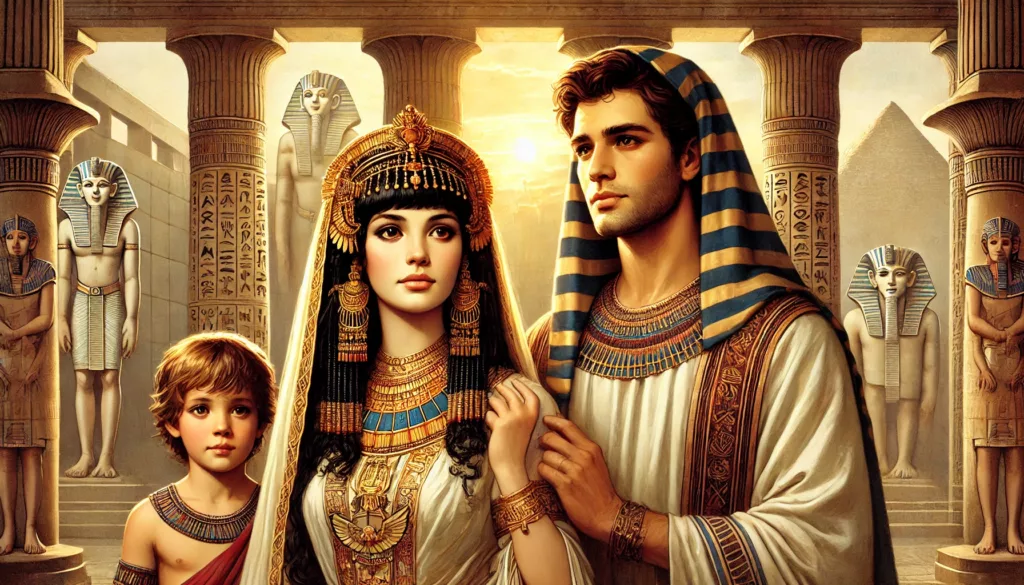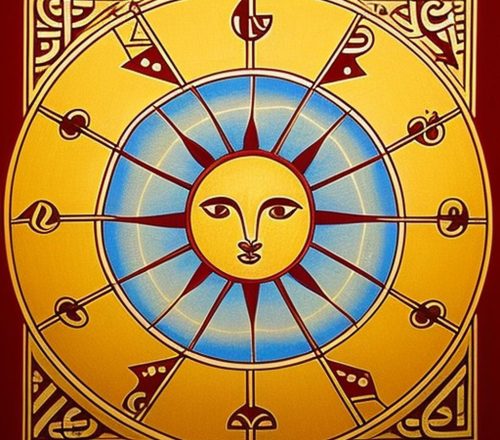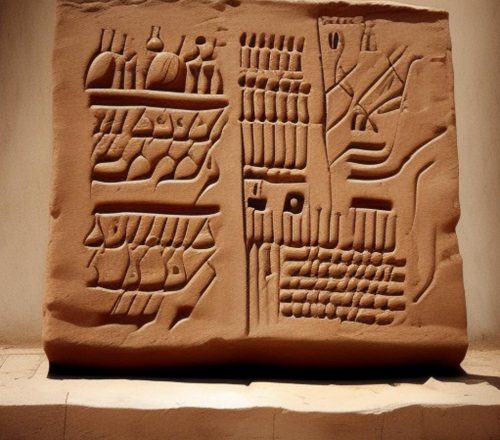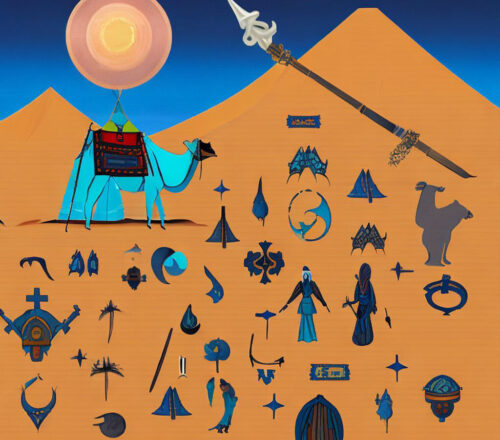
Table of Contents
Asenath Bridging Hebrew and Egyptian Cultures
Asenath is a relatively obscure yet fascinating figure in the Bible, her story subtly woven into the larger narrative of Joseph in the Book of Genesis. As the daughter of Potiphera, an Egyptian priest, and the wife of Joseph, she represents a significant cultural and religious intersection between the Hebrew people and ancient Egypt.
Background and Historical Context
Asenath’s father, Potiphera, was a priest of On, also known as Heliopolis, one of the most significant religious centers in ancient Egypt. Heliopolis was dedicated to the worship of the sun god Ra, making Potiphera a prominent religious figure. This context is essential for understanding Asenath’s heritage and the potential influences she might have brought into her marriage with Joseph.
Joseph’s journey to Egypt began when he was sold into slavery by his jealous brothers. His ability to interpret dreams eventually brought him to the attention of Pharaoh, who appointed him as his second-in-command. As part of his rise to power, Pharaoh gave Joseph an Egyptian name, Zaphenath-Paneah, and arranged his marriage to Asenath. This union was not only a personal milestone for Joseph but also a strategic alliance, strengthening his integration into Egyptian society.
The Marriage of Joseph and Asenath
The marriage between Joseph and Asenath is briefly mentioned in Genesis 41:45:
“Pharaoh gave Joseph the name Zaphenath-Paneah and gave him Asenath daughter of Potiphera, priest of On, to be his wife. And Joseph went throughout the land of Egypt.“
This verse highlights the political and social significance of their union. By marrying the daughter of a high-ranking Egyptian priest, Joseph’s position and acceptance in Egyptian society were solidified. Asenath, on the other hand, would have found herself in a unique position, bridging two cultures that were historically distinct and often at odds.
Cultural and Religious Significance
The marriage of Asenath and Joseph can be seen as a symbol of cultural and religious convergence. Joseph, a Hebrew who remained faithful to the God of his fathers, and Asenath, an Egyptian with ties to the priestly class, likely navigated a complex interplay of beliefs and practices in their household. Their union could be seen as a microcosm of the broader interactions between the Hebrews and Egyptians.
In the context of Hebrew culture, Asenath’s story is significant because it underscores the theme of God’s providence and faithfulness. Joseph’s rise to power in a foreign land and his marriage to Asenath reflect the fulfillment of God’s promises to Abraham, Isaac, and Jacob, ensuring that their descendants would flourish even in foreign lands.
From an Egyptian perspective, the marriage would have been seen as a strategic alliance, blending Joseph’s administrative prowess and divine favor with the religious authority and social standing of Potiphera’s household. This blend of cultures might have influenced the upbringing of their children, Manasseh and Ephraim, who would later become prominent tribes in Israel.
Asenath in Later Traditions
Asenath’s story does not end with the brief mentions in Genesis. Later Jewish traditions and extra-biblical texts expanded on her narrative. One such work is “Joseph and Asenath,” a Hellenistic Jewish romance that portrays her conversion to the worship of the Hebrew God and her deep love for Joseph. This text, though not considered canonical, offers insight into how Asenath’s story was understood and developed in later Jewish thought.
In “Joseph and Asenath,” Asenath undergoes a dramatic transformation, rejecting the idols of her father’s house and embracing monotheism. This tale reflects themes of repentance, conversion, and divine favor, aligning her more closely with Hebrew religious values and emphasizing her role as a righteous matriarch in the lineage of Israel.
Legacy and Reflection
Asenath’s legacy is multifaceted. As a historical and cultural figure, she embodies the blending of Hebrew and Egyptian cultures, showcasing the complex relationships between these two ancient civilizations. Her story, though brief in the biblical text, invites reflection on themes of identity, faith, and integration.
For modern readers, Asenath can be seen as a figure of reconciliation and unity. Her marriage to Joseph symbolizes the potential for harmony and mutual respect between different cultures and religions. Her narrative encourages us to look beyond differences and seek common ground, fostering understanding and cooperation in a diverse world.
Asenath, the daughter of an Egyptian priest and the wife of a Hebrew patriarch, stands as a testament to the rich tapestry of human history and the enduring power of cultural and religious integration. Her story, though understated in the Bible, offers profound insights into the dynamics of faith, identity, and unity that continue to resonate through the ages.
Meaning of the egypytian names in the story of Joseph and Asenath
The names in the story of Joseph and Asenath, particularly the Egyptian names, hold significant meanings and offer insight into their characters and the cultural context of the time.
Asenath
Meaning: The name Asenath (אסנת) is believed to mean “gift of the sun” or “belonging to Neith,” reflecting her Egyptian heritage. Neith was an ancient Egyptian goddess associated with wisdom, weaving, and war, often depicted as a fierce protector.
Potiphera
Meaning: Potiphera (פּוֹטִיפֶרַע), also spelled Potipherah, means “he whom Ra has given” or “he who belongs to Ra.” Ra was the ancient Egyptian sun god, one of the most important deities in Egyptian mythology. As a priest of On (Heliopolis), Potiphera’s name emphasizes his religious role and the significance of the sun god in his duties.
Zaphenath-Paneah
Meaning: Joseph’s Egyptian name, Zaphenath-Paneah (צָפְנַת פַּעְנֵחַ), given to him by Pharaoh, has been subject to various interpretations. While the exact meaning is uncertain, it is often translated as “God speaks, he lives” or “the revealer of secrets.” This name underscores Joseph’s role in interpreting Pharaoh’s dreams and his divine gift of wisdom.
These names highlight the integration of Hebrew and Egyptian cultures in the narrative. Asenath’s and Potiphera’s names reflect their deep connections to Egyptian religious traditions, while Joseph’s new name signifies his acceptance and important status within the Egyptian court. Together, these names enrich the story by providing a deeper understanding of the characters’ identities and their roles within the broader cultural and religious landscape of the time.
Shop Tip
Prayer to El Elyon
O El Elyon, Most High God, Creator of heaven and earth,
We come before You with hearts full of awe and reverence.
In the spirit of our ancestor Joseph, who bridged the lands of Canaan and Egypt,
We unite in praise, drawing from the rich heritage of both cultures.
God of Abraham, Isaac, and Jacob, who guided Joseph to prominence in a foreign land,
Grant us wisdom to see Your hand in all things,
just as You revealed dreams and visions to Joseph.
Ra, the great sun that gives life and light, reflects but a fraction of Your true glory, For You, El Elyon, are the source of all light and life, surpassing all earthly powers and principalities.
We honor the wisdom of the ancients, the priests of On,
who sought understanding of the divine,
And we embrace the truth revealed to our forefathers,
that You alone are the Most High, El Elyon.
Asenath, daughter of Egypt, joined in union with Joseph, Your faithful servant,
So we, too, seek unity and harmony, blending the wisdom of many cultures in worship of You.
Bless us, O El Elyon, with the strength of Joseph and the grace of Asenath,
That we might navigate the complexities of our world with faith and integrity.
May our lives be a testament to Your power and love,
As we walk in the light of Your presence, guided by Your eternal truth.
Baruch Atah, El Elyon, Blessed are You, Most High God,
For You reign over all the earth, in majesty and in mercy.
Amen.
This prayer aims to honor the rich spiritual traditions of both Hebrew and Egyptian cultures, acknowledging the universal reverence for the One Most High, El Elyon.
Blessings to you!
Take time to learn
Invest in your future
Embark on a journey into the realm of affiliate marketing and craft your own website within a vibrant, supportive community. Join me in this adventure, where you can begin as a free starter and stay as long as you desire. Enjoy complimentary hosting and foundational teachings to set you on your path. For those with advanced skills, opportunities to elevate your expertise await. Take a moment to explore and witness the magic for yourself!




